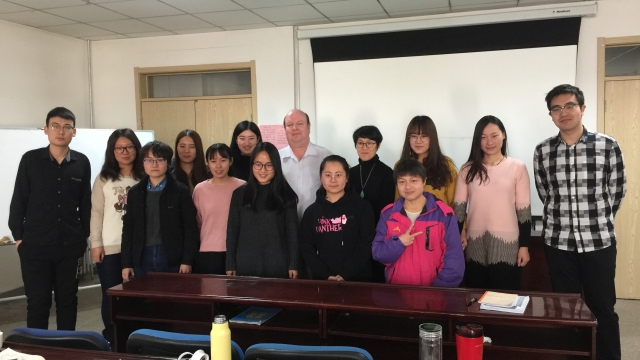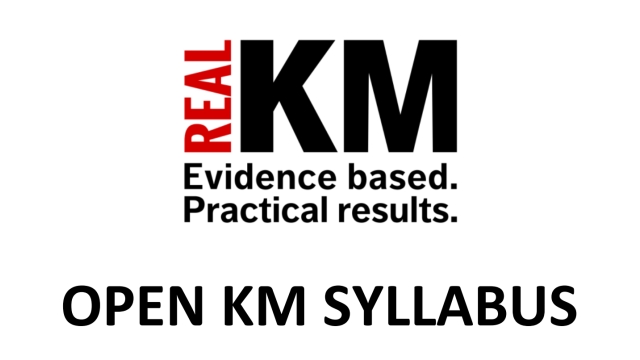
KM competence in graduate KM education [EKM series]
Editor’s note: This is a continuing serialisation of edited portions of Andre Saito’s PhD.
In the previous article, a model of knowledge management (KM) competence was introduced, consisting of three main elements: KM activities, KM capabilities, and four major perspectives on KM. In this article, we seek to refine the model by investigating what kind of competence is being developed in current graduate KM education.
We start with an overview of KM education, describing current alternatives for those seeking instruction in the field. Next, we explain the study design, including data collection and analytical methods, and detail the main results. Finally, we discuss some major implications, commenting upon the biased approach of existing programs and the challenges for future development.
Overview of KM education
Before deciding to focus on master’s programs in KM, we carried out a survey of current KM education to explore the alternatives available to those seeking instruction in the field. We decided to focus on master’s degrees only, because they usually address a broader and deeper content, if compared to certificate and diploma programs, and have a more established and consistent curriculum, if compared to doctoral programs.
Among the 40 masters programs identified, 28 were dedicated to KM, with the totality or majority of courses related to the subject, and 12 were degrees in other fields with KM as an area of concentration. Library and information science schools / departments were the most active in KM education, offering 14 of the programs. Those from computer science and information systems came second, with 11, and those from management, business and public administration third, with 8 programs. KM education is also being offered by engineering and education schools / departments, with 4 and 3 programs respectively.
The masters programs vary significantly in structure and teaching mode. The duration ranges from two semesters to three years; attendance may be full-time or part-time; there are programs offered on campus, online, or as a combination of both; classes may be concentrated in certain periods or distributed evenly along the semester; and course sequence may be chosen individually or must be followed in groups, in a cohort mode.
Analysis of masters programs in KM
In this study we sought to surface the assumptions on KM competence implicit in the curricula of masters programs in KM. We analyzed programs’ objectives, structure, contents and teaching methods in order to infer the presumed ideas about the nature of KM, its functions and activities, and the capabilities needed to perform it well. The core data used in the analysis were the programs’ descriptions (objectives, organization, topics covered, delivery mode, duration, audience, requirements, etc.) and individual course information.
We used KM perspectives as proxy for KM activities. As we have discussed previously, the KM perspective defines the scope of the KM activity, or what is supposed to be performed under the guise of KM. Implicit in the KM perspective is a particular understanding of the roles and tasks associated with KM. Since there is a close correspondence between particular KM perspectives and typical KM activities, we adopted the former as a shortcut to refer to the activity set element of our model of KM competence. Thus, for each course that comprises a given program, we assessed the correspondence between its contents / objectives and each of the four KM perspectives.
We also sought to identify what kind of capabilities each course was designed to develop. In a similar way, we used the six categories proposed in our model of KM competence (strategic, organizational, knowledge-oriented, technological, inter-personal, and personal) as a proxy to a cluster of related capabilities. It is important to keep in mind that those categories may be interpreted differently according to each KM perspective.
Summary of findings
The main finding is that there are indeed some typical profiles of KM competence being taught in masters programs in KM. We found and characterized four of them in the curricula analysis: information manager, learning facilitator, knowledge systems developer and KM manager. The information manager usually focus on activities like organizing information, providing information services and developing information policies. The learning facilitator, on the other hand, concentrates on fostering collaboration and team work, designing and conducting organizational interventions, and promoting individual learning. The knowledge systems developer gives priority to engineering knowledge, mining knowledge in data, and developing systems. And finally, the KM manager commonly works on planning and carrying out KM projects, aligning KM initiatives with business strategy, and implementing an infrastructure for KM.
KM competence profiles being taught in masters programs in KM:
The information manager (10 programs)
- Typical activities
- Organizing and managing information resources
- Providing information services
- Designing and implementing KM systems
- Typical courses taught
- Introduction to KM
- Information Organization
- Information Access & Retrieval
- Information Sources & Services
- Technologies for KM
- KM and the Organization
- Sample programs
- Kent State University
- University of Oklahoma
- Loughborough University
- Nanyang Technological University
- University of Technology Sydney
The learning facilitator (1 program)
- Typical activities
- Fostering communication and collaboration
- Designing and conducting organizational interventions
- Promoting individual learning
- Typical courses taught
- Organizational Learning
- Organizational Analysis
- Organizational Culture
- Organizational Change
- Technologies for KM
- Group Dynamics
- Programs
- George Mason University
- Lancaster University (partially)
The systems developer (2 programs)
- Typical activities
- Developing systems for decision support
- Knowledge representation and engineering
- Knowledge discovery and data mining
- Typical courses taught
- KM and KM Systems
- Systems Analysis & Design
- Data Management
- Management Systems
- Discovery & Data Mining
- Knowledge Representation
- Programs
- Middlesex University
- University of Westminster
- Dublin Institute of Technology (partially)
- Cranfield University, SAS (partially)
- Cranfield University, DCMT (partially)
The KM manager (2 programs)
- Typical activities
- Planning and conducting KM projects
- Aligning KM initiatives with business strategy
- Implementing KM infrastructure
- Typical courses taught
- Introduction to KM
- Strategic Management
- Organizational Learning
- Technologies for KM
- KM Processes and Practice
- Change Management
- Programs
- Hong Kong Polytechnic University
- University of Hull (not longer available)
- University of Melbourne (partially)
Another important finding is that there is a close correspondence between the original field of the school or department coordinating the program and the KM competence profile being taught. The clearest cases are those from the fields of library and information science, and computer science and information systems. Schools from the first all focused on the information manager profile, while those from the second typically emphasized that of the knowledge systems developer. Schools in the management, engineering, and education fields had a less clear typical profile, although some tendency may exist. Management schools may tend to focus on the learning facilitator, engineering ones on the knowledge systems developer, and education ones on something close to the information manager.
Implications
Defining the boundaries and essence of KM
The most obvious challenge in the study was to define the scope of KM, to decide what is part of KM and what is not. Although we tried to be as comprehensive and inclusive as possible, the inclusion of some topics into the KM discipline may be questioned. There are some topics that can be hardly considered as part of KM. For instance, to what extent financial engineering and e-business are related to KM? Although some relationship may be argued, it seems a misstatement to label a program on those topics a KM program. Other topics are surely associated with KM – e.g., lifelong learning, adult education, human resources management, process improvement, web design – and are often cited in the literature, but are they equivalent to KM, or should they be considered contributions to it? In the same way, to call a program focusing on those topics a KM program seems to be somewhat misleading.
Another issue related to the definition of KM is the prevalence of programs focusing on the information manager profile. From 28 master’s in KM identified, 13, or around half, can be said to be developing such kind of KM competence. If we consider only the 15 master’s more closely related to KM, we end up with 10 such programs, or 2/3 of the total. This contrasts with the results from the questionnaire survey, where the human perspective represented roughly half of respondents. The dominance of KM programs focusing on the that profile is relevant because education is largely responsible for the reproduction of a discipline, and in the long term the field of KM may be restricted to information management.
Integrating KM perspectives and program’s curriculum
Most programs have a clear bias towards one of the perspectives, mostly due to the background of the coordinating school and the faculty members designing and teaching the program. The lack of faculty from diverse fields of specialization available to teach the program seems to be the critical constraint in KM programs. Several schools addressed that issue by collaborating with one or more other schools/departments in the same university. The result in most cases, however, did not seem very satisfactory, for the collaboration was usually restricted to the provision of electives from other departments, without any adaptation to the particular aims of the program. The best cases of integration among perspectives seemed to be those whose program coordinator had a broad and deep understanding of KM, regardless of the field of the school he/she belonged to. We could observe that in the programs from a business school and a school of engineering.
Another important implication is the observation of different levels of integration among perspectives. We found some programs providing a relatively broader treatment of KM by introducing elements from other perspectives, but still within the original perspective as a background. The clearest example is of programs developing the information manager profile which included competitive intelligence or intellectual capital, for instance, in their curricula. Although those topics are related to an strategic orientation, their essence still is information management. A closer integration was achieved by programs focusing on the strategic management of KM initiatives. That provided a clearer alignment with a strategy-oriented perspective, but still seeing KM as a business function, separated from others like human resources, information technology or finance. Such an approach to KM is linked with business strategy, but not yet focused on building organizational capability or managing innovation and knowledge creation, the essence of an strategy-oriented perspective.
A final comment regarding integration relates to the consistency of the program as a whole, or the coherence among courses that comprises it. Some programs, usually those involving a collaboration between different schools/departments, have a set of courses that show little relationship among them. A closer look into courses’ design and contents indicate that they are self-contained and offered in an isolated way, without much reference to or relationship with other courses in the same program. Some programs, however, do show a good level of integration among courses, with each seeking to complement the others. The courses seem to have been designed with a common purpose in mind, with a very clear understanding of the desired profile of the future graduate. For instance, the program from California State University at Northridge was designed with the clear intention of providing education for information professionals, and the program at George Mason University focus on what they call the new professional or the reflective practitioner, a professional dedicated to organizational learning.
Clarifying the nature of KM capabilities
The correspondence between KM capabilities and perspectives is much more evident in the analysis of KM programs than in the questionnaire survey. Here, results show a clear pattern of emphasis on particular perspectives and greater relevance of certain capability categories. A preference for the information perspective shows a predominance of knowledge-oriented capabilities in the competence profiles. A preference for the computing perspective is associated with a stronger focus on technological capabilities, something that was not confirmed in the questionnaire survey. A preference for the human perspective corresponds to a greater emphasis on organizational capabilities. And the two programs which show a certain balance among perspectives also balance strategic, organizational and knowledge-oriented capabilities. This closer correspondence between given perspectives and certain capability categories may indicate that either (1) capabilities needed for good performance in activities from a given perspective indeed concentrate on certain categories, or (2) it may simply reflect the background of the program’s coordinator and instructors, which constrains the range of capabilities being developed. In any case, that correspondence indicates a rather functional approach to KM, instead of a more desirable interdisciplinary one.
Also, the analysis of individual courses’ syllabuses and summaries confirmed the need to contextualize the meaning of capability categories, something that was already suggested in the questionnaire survey. For instance, strategic capabilities may mean the ability to plan and execute the provision of information services in the case of LIS-based programs, or of learning services in the case of education-based ones. Organizational capabilities may be related to organizational analysis and design in management-based programs, modeling of business processes in engineering-based programs, or assessing the impact of systems implementation in CS/IS-based programs. This suggests that the description of particular configurations of capabilities must go beyond the indication of the most relevant categories, but also provide clues on which specific kind of capabilities are needed.
And finally, we found evidence that the course’s method of instruction is as important for the development of capabilities as the content itself. This was very much clear in the program from George Mason University, for instance, which adopted an experiential learning approach in all of its courses. Such an approach put a strong emphasis on the development of personal and inter-personal capabilities, regardless of the topic being studied. Another good example is that of one the more balanced programs, which include a very broad coverage of topics related to KM, from several perspectives. In this case however, there was little evidence of more active learning methods, and teaching seemed to be based simply on transfer of content. As we have already mentioned, knowing that is essentially different from knowing how, and understanding a subject does not correspond to being able to practice it.
Next edition: Educating Knowledge Managers series: Conclusions.







I think another element which may relevant to KM competencies the individuals. when they learn and understand the course materials they should understand and show in their behavior. if they understanding doesn’t change their behavior even the best course material they receive , it doesn’t work,
This is a fascinating overview of the various competencies you identified from your doctoral work (which I just downloaded).
What did you use to critique the programs, via looking at their websites and self-descriptions or somehow gathering a sense of what actually happened in the programs? Also, how long ago was this done, related to how current this framework is and if you have any thoughts about how it may have developed since then?